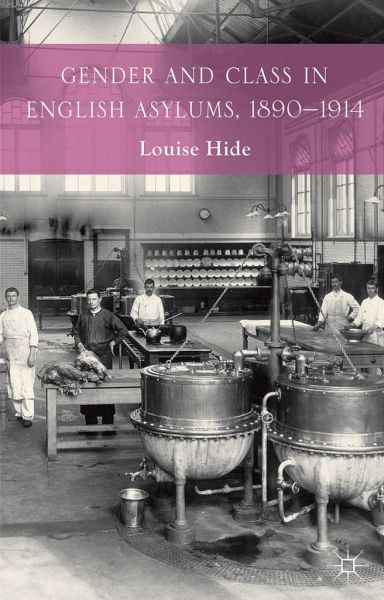
L. Hide
Gebundenes Buch
Gender and Class in English Asylums, 1890-1914
Versandkostenfrei!
Versandfertig in 6-10 Tagen
Weitere Ausgaben:

PAYBACK Punkte
19 °P sammeln!





An unprecedented number of people were sent to 'lunatic asylums' in the nineteenth century. But what was life like inside? How was order maintained? And why were so many doctors on the verge of a breakdown themselves? This book provides a glimpse into the lives of patients and staff inside two London asylums at the turn of the twentieth century.
Louise Hide is an Honorary Research Fellow at Birkbeck College, University of London, UK where she completed her PhD and has been working as a researcher on a three-year Wellcome Trust funded project on the history of bodily pain. This is her second work of non-fiction.
Produktdetails
- Verlag: Palgrave Macmillan / Palgrave Macmillan UK / Springer Palgrave Macmillan
- Artikelnr. des Verlages: 978-1-137-32142-8
- 2014
- Seitenzahl: 240
- Erscheinungstermin: 1. September 2014
- Englisch
- Abmessung: 218mm x 140mm x 23mm
- Gewicht: 445g
- ISBN-13: 9781137321428
- ISBN-10: 1137321423
- Artikelnr.: 41311217
Herstellerkennzeichnung
Libri GmbH
Europaallee 1
36244 Bad Hersfeld
gpsr@libri.de
"Gender and Class in English Asylums, 1890-1914 is a successful transition in Hide's research interests. ... Gender and Class in English Asylums, 1890-1914 is an essential read for those beginning to grapple with the place of gender and class in British asylums." (Jennifer Farquharson, History of Psychiatry, Vol. 26 (3), September, 2016)
"The book is written in such a way as to be easily accessible and enjoyed by readers who may not have previous knowledge of the asylum system. ... this study is well researched, and the author shows a depth of understanding that makes this book an enjoyable read. ... it will be useful to many scholars of asylum, medical, and social history." (Dee Hoole, H-Disability, H-Net Reviews, h-net.org, June,
"The book is written in such a way as to be easily accessible and enjoyed by readers who may not have previous knowledge of the asylum system. ... this study is well researched, and the author shows a depth of understanding that makes this book an enjoyable read. ... it will be useful to many scholars of asylum, medical, and social history." (Dee Hoole, H-Disability, H-Net Reviews, h-net.org, June,
Mehr anzeigen
2016)
"Louise Hide's Gender and Class in English Asylums, 1890-1914 is an excellent book. Inmany ways it returns readers to the central intellectual concerns of the vast asylum literature, and pivots on a historical interpretation of the 'total institution' concept examined by Erving Goffman. ... This volume is a well-written history, one driven by intrinsically interesting narratives and accounts of these institutional worlds and their inhabitants." (Catharine Coleborne, Social History of Medicine, October, 2015)
"Louise Hide's meticulously researched book shows that this was far from the full story and that, on the contrary, it was a period of transition when interesting things were taking place even within the large institutions. ... This highly recommended book shows conclusively that this was far being a period of stagnation in the development of institutional mental health provision." (Leonard Smith, Medical History, Vol. 59 (3), July, 2015)
"Louise Hide's Gender and Class in English Asylums, 1890-1914 is an excellent book. Inmany ways it returns readers to the central intellectual concerns of the vast asylum literature, and pivots on a historical interpretation of the 'total institution' concept examined by Erving Goffman. ... This volume is a well-written history, one driven by intrinsically interesting narratives and accounts of these institutional worlds and their inhabitants." (Catharine Coleborne, Social History of Medicine, October, 2015)
"Louise Hide's meticulously researched book shows that this was far from the full story and that, on the contrary, it was a period of transition when interesting things were taking place even within the large institutions. ... This highly recommended book shows conclusively that this was far being a period of stagnation in the development of institutional mental health provision." (Leonard Smith, Medical History, Vol. 59 (3), July, 2015)
Schließen
Für dieses Produkt wurde noch keine Bewertung abgegeben. Wir würden uns sehr freuen, wenn du die erste Bewertung schreibst!
Eine Bewertung schreiben
Eine Bewertung schreiben
Andere Kunden interessierten sich für











